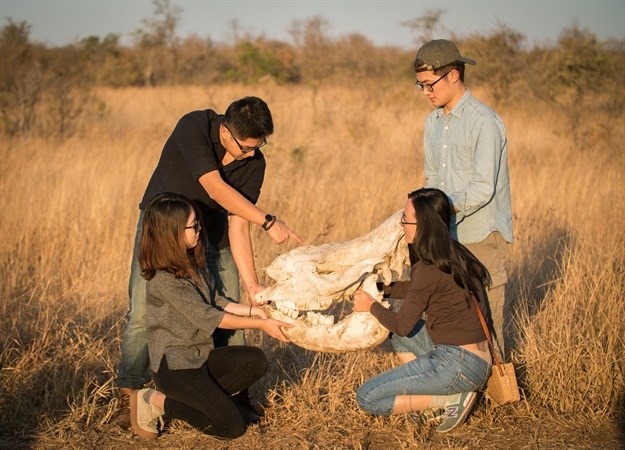





Studying at the university’s School of Design and Innovation, which seeks to use design as an instrument to address societal problems and influence positive change within society, the students have dedicated themselves to developing culturally and audience-appropriate demand management design initiatives.

Under the leadership of Professor Mo Jiao, professor in design and innovation at Tongji University, and supported by South African non-profit Peace Parks Foundation, this project afforded the students an opportunity to take on new challenges and expand their perspectives.
The students started their process with efforts to gain insight into a Chinese perspective on consumption of rhino horn. The conclusions were twofold: firstly, the general public remains grossly misinformed as to the subject of rhino poaching, and ongoing education and awareness to compliment judicial and counter-trafficking interventions are key. Secondly, in large, overpopulated and polluted cities such as Shanghai, the Chinese people have lost their emotional and primal connection to the natural world, and with it their perspective on the importance of protecting it.
These findings set the stage for the development of a range of designs aimed at restoring a positive engagement between people and nature. “With our designs we want to rebuild the connections, the emotional connections between the people of China and the rhino,” shared design student Shiyujia Tang.
The students delivered professional marketing pitches with consumer-tested and skillfully designed products. Spurred on with vigour and passion for the cause, the students took to the streets, shopping centres and schools of Shanghai to test their designs and at the same time educate their communities about the plight of the rhino by means of video games, participatory drawing activities, 3D-rhino puzzles, and exquisite interactive rhino figurines. Included in the top designs was a mobile application that engages the Chinese people in fundraising and activism for rhino protection. The top performing team produced a professionally designed rhino-branded breathing (anti-pollution) mask that, in its functionality, also symbolises the connection between the need for environmental vigilance for both animals and humans.
The students displayed their projects at the DOO+ social innovation exhibition hosted by PriceWaterhouseCoopers in Shanghai. The projects were selected for display due to their significance in presenting innovative ways to create social awareness of the plight of rhino due to illegal rhino horn trade and consumption.
In July 2017, representatives from the teams who presented the most innovative and marketable ideas, were brought to South Africa by Peace Parks Foundation for their first glimpse of rhino in the wild. The aim was to provide them with enhanced insight and revitalised inspiration for the final refinement of their designs. On location at the Southern African Wildlife College, the students also had opportunity to exchange ideas with experts in the local conservation industry so as to pave the way for impactful, real-world implementation of their concepts.

Brad Poole, combating wildlife crime programme manager for Peace Parks Foundation, remarked, “If we want to secure the future of our natural heritage, we have to invest in the youth. Whilst it is our goal to educate them, they bring so much value – so much insight and so much enthusiasm – that it actually becomes a learning process for us. And so we both benefit.”
The group of young people were deeply touched by what they experienced during their exploration of Kruger National Park. Seeing the skeletal remains of a poached rhino combined with an emotional visit to rhino calves that had been orphaned through poaching, truly brought home the horror of the rhino’s plight. Inspired by the contrasting strength and vulnerability of this prehistoric creature, these students have vowed to use their innovative design skills to take tangible action towards continued and expansive dissemination of demand management messaging in China.
Standing next to the remains of a slain rhino, Jiao emotionally declared: “We are expecting the people of China to start treating rhino as a life, not a product.”
“There is still much to be done, and we (the Chinese people) are the ones who have to take action – no one else will do it for us,” concluded Tang.